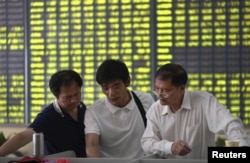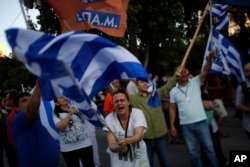Just hours after Greeks voted decisively to reject an international bailout Asian stock market players predictably reacted negatively. The region’s benchmark composite index saw its biggest single-day drop in five months.
Meanwhile on the Chinese mainland, there was a mixed result after the government moved to halt a three-week stock slide by suspending fresh initial public offerings and backing a plan by brokers to buy shares.
In Tokyo the benchmark Nikkei average of 225 shares lost more than 2 percent.
Japan’s top government spokesman brushed off contagion from the drama in Athens.
“The ties between Japan and Greece economically and in the financial markets are very limited,” said chief cabinet secretary Yoshihide Suga. “I believe the euro zone nations will take responsible actions to address the Greek situation.”
South Korea’s Kospi closed down 2.4 percent.
Volatility continues on China exchanges
Hong Kong’s Hang Seng index, influenced by both the events in Greece and the tumbling mainland Chinese stock markets, plunged more than 800 points to close down 3.2 percent, its largest single-day drop in more than three years.
“For the next few days you are going to have a lot of safety plays and, at this point, it doesn't look like the Hang Seng is really a safety play for people,” said Tony Nash, chief economist at Complete Intelligence, a Singapore consultancy.
The Shanghai stock exchange saw its composite index close up 2.4 percent, while in Shenzhen the component index dropped 1.4 percent.
Trading on both the exchanges is dominated by domestic retail investors who have shifted their money from the deflated Chinese property market.
The China sell-off — the steepest plunge in two decades — since June 12 has seen as much as $3 trillion shorn from the mainland market — six times the total foreign debt of Greece.
Emergency measures
Between Friday's close and Monday's open Chinese authorities rolled out unprecedented emergency measures to try to halt the plunge.
Fund managers and brokerages, backed by the state-supported margin finance company and a direct line of equity from the central bank, pledged a massive stock-buying campaign.
New share issues were also put on hold.
But some market watchers, such as Tony Nash in Singapore, are skeptical such moves can be effective.
“You can't inject $120 billion every weekend. The markets lost something like three trillion over the last couple of months, so that's a drop in the bucket compared to what would be needed to prop that market up,” Nash told VOA.
Greek referendum impact
The Greek referendum also was viewed as bad luck for the Chinese authorities.
“They probably didn't expect a Greek 'no,' and so the timing of those measures was particularly bad,” explained Nash.
In a hastily arranged referendum Sunday, 61 percent of Greek voters objected to terms of a bailout offered by the European Union, the European Central Bank and the International Monetary Fund.
That came after weeks of acrimonious negotiations with Greek authorities.
EU leaders are to hold a summit Tuesday to discuss the economic crisis.







